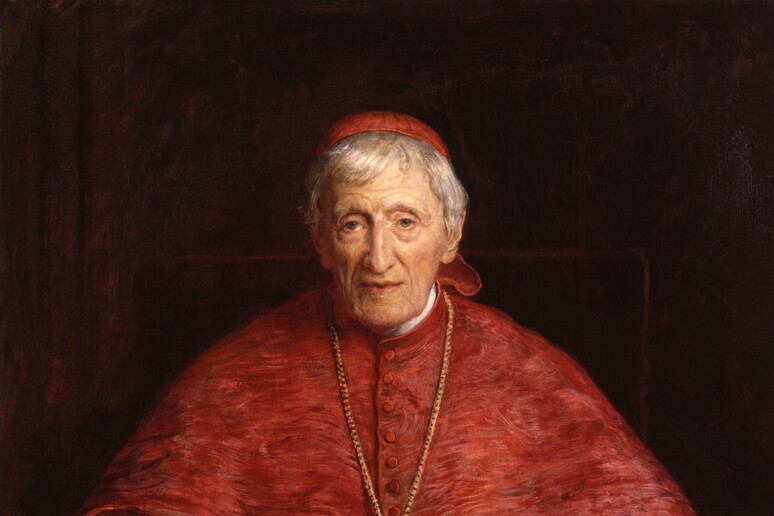Pope Francis will make
Carinal John Henry Newman, a Catholic convert from Anglicism and
one of the most influential English churchmen of the 19th
century, a saint on October 13, the Vatican announced on Monday.
The Vatican said in that Newman would become a saint after
the pope authorised the Congregation for the Causes of Saints to
promulgate the miracle attributed to him that gets him on the
final rung towards sainthood, making him the first English saint
since 40 Reformation martyrs were canonised in 1970.
The Vatican did not give details in announcing Francis'
approval of this second miracle.
But Catholic media last year reported that a pregnant woman's
recovery, with no scientific explanation, from a
life-threatening illness, had been confirmed by Church officials
and attributed to Newman's intercession.
Newman (London 1801-Edgbaston 1890) is the best-known English
churchman of the 19th century.
An Anglican priest and thinker who caused immense controversy
in Victorian England by converting to Catholicism, he was once
described by the late pope John Paul II as "that great man of
God".
He moved a step closer to sainthood in 2009 when Pope
Benedict XVI approved the publication of the first miracle
attributed to him, paving the way for his beatification the
following year.
An English deacon said he recovered from an incurable
back ailment in 2001 thanks to Newman's intercession.
The Catholic Church in England has been eagerly awaiting
Newman's canonisation.
President of the Catholic Bishops' Conference of England and
Wales, Cardinal Vincent Nichols has welcomed the news.
"Newman's exploration of faith, depth of personal courage,
intellectual clarity and cultural sensitivity make him a deeply
admired follower of Christ," Nichols said.
"He brings together so many of the best of Catholic
traditions shared well beyond the Catholic Church. His
canonisation will be welcomed especially in the Church of
England and the wider Anglican Communion."
Benedict attended Newman's beatification when he visited the
United Kingdom in 2010.
Newman, who died in 1890, started on the long process
leading to sainthood in 1958. He achieved the first stage of
being declared venerable in 1991 but then things ground to a
halt.
Despite his fame, and the reverence in which he was
held by English-speaking Catholics, Newman's promoters were
unable to find a credible case to present to the Vatican -
until a deacon in Newman's long-time home of Birmingham, Jack
Sullivan, came forward.
According to Catholic doctrine, miracles happen when a
prospective saint, who is in heaven, intercedes with God and
asks for a special favour to be granted. Most miracles in
sainthood causes are medically inexplicable cures.
Pope Benedict was believed by some to be in favour of
hastening Newman on the path to sainthood.
"The cause is likely to be close to Benedict's heart
because he has been a fan of Newman since his student days,"
said an author of a book on Newman and Benedict, Peter
Jennings.
Jennings cited a speech given by the then Cardinal
Ratzinger in 1991.
In the speech the cardinal recalled starting his
seminarian studies in 1946 and discussing theology and
philosophy with a close friend.
"Newman was always present to us," he said.
Newman, the son of a banker, was born in 1801 in London and
was ordained as a Church of England priest in 1825. He rapidly
became one of the country's leading intellectuals.
In 1833, after a trip to Sicily in which he fell gravely
ill, he returned to England and started the Oxford Movement,
which aimed to breathe new life into the Church of England.
His ideas caused controversy in the late 1830s and he
retired from public life. In 1845 he converted to Roman
Catholicism and lost many friends as a result.
After his ordination in Rome, Newman founded the
Birmingham Oratory, a Catholic community and school in
Birmingham in the English Midlands, through which he helped the
poor.
He later moved to Dublin, where he founded University
College. In 1879, he was made a cardinal by Pope Leo XIII, as
a tribute to his work and devotion to his faith.
Apart from the group of English Catholic martyrs, who were
canonised in 1970, Cardinal Newman would be the first English
saint from the time after the Reformation, the 16th century
movement which resulted in the birth of Protestant churches.
Two Englishmen, Sir Thomas More and Bishop John Fisher,
were declared saints in 1935 but they both lived in the 16th
century.
Aside from his beatification prospects, Newman has
claimed headlines after Birmingham religious authorities ordered
his grave in a suburb of the city to be opened so he could be
moved to the Oratory.
The media reported controversy about Newman being "taken
away" from his long-time friend, fellow convert Ambrose
St.John, who was buried with him.
But no remains were found in the decayed wooden coffin.
The Catholic church reacted angrily to claims that Newman was
gay.
ALL RIGHTS RESERVED © Copyright ANSA











